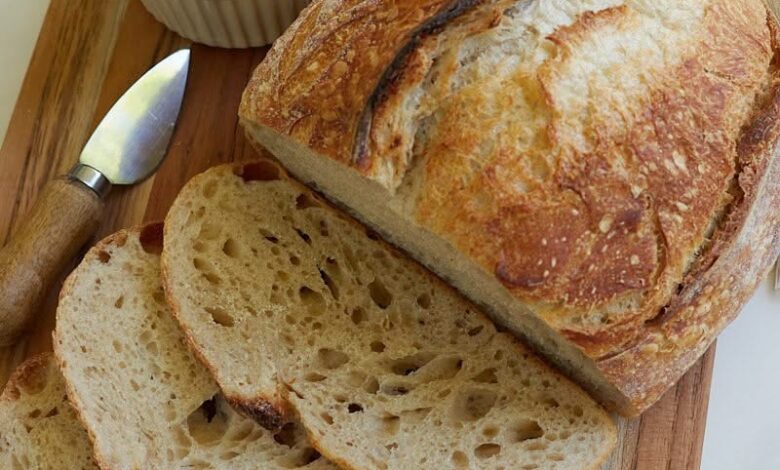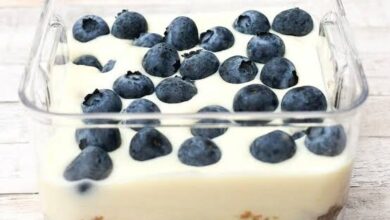Artisan Sourdough Bread Recipe

Introduction
Few things are as comforting and satisfying as the aroma of freshly baked sourdough bread wafting through your kitchen. With its crisp crust, chewy crumb, and rich tangy flavor, artisan sourdough is a true expression of patience and craftsmanship.
Unlike commercial loaves, artisan sourdough relies on a natural starter — a living mixture of flour and water — that gives it a distinctive flavor and texture. The fermentation process not only enhances the taste but also improves digestibility and shelf life.
Baking sourdough from scratch can seem intimidating, but with time, care, and a few simple ingredients, you’ll soon master this timeless art. Each loaf you bake will feel like an accomplishment — rustic, beautiful, and utterly delicious.
Cooking Time and Serving
- Prep Time: 25 minutes (plus 8–12 hours fermentation)
- Cook Time: 40–45 minutes
- Total Time: 9–13 hours
- Servings: Makes 1 large loaf (8–10 slices)
Ingredients
For the Dough:
- 500 g (about 4 cups) bread flour
- 350 g (1½ cups) water (room temperature)
- 100 g (½ cup) active sourdough starter
- 10 g (2 tsp) fine sea salt
For Dusting and Handling:
- Extra flour or rice flour for dusting
- A little olive oil (optional)
How to Make Artisan Sourdough Bread
Step 1: Mix the Dough
In a large bowl, combine the sourdough starter and water. Stir to dissolve the starter. Add the flour and mix until no dry spots remain. The dough will be shaggy and sticky — that’s normal. Cover the bowl and let it rest for 1 hour (this is called the autolyse).
Step 2: Add Salt and Begin Bulk Fermentation
Sprinkle in the salt and mix by hand, folding the dough over itself until well combined. Cover the bowl again and let the dough rise at room temperature for 4–6 hours. During this time, perform 3–4 sets of “stretch and folds” every 30 minutes in the first 2 hours.
Step 3: Shape the Dough
Once the dough has roughly doubled in size, gently turn it out onto a lightly floured surface. Shape it into a round or oval loaf by tucking the edges underneath to create surface tension. Place the shaped dough into a floured proofing basket (or bowl lined with a floured towel).
Step 4: Final Proof
Cover and refrigerate overnight (8–12 hours). This slow fermentation enhances flavor and structure.
Step 5: Preheat and Score
Preheat your oven to 230°C (450°F) with a Dutch oven inside for at least 30 minutes. Remove the dough from the fridge, gently invert it onto parchment paper, and score the top with a sharp blade or lame.
Step 6: Bake the Bread
Carefully place the dough (on parchment) into the hot Dutch oven. Cover and bake for 20 minutes. Then uncover and bake another 20–25 minutes until deep golden brown.
Step 7: Cool and Enjoy
Remove the loaf from the oven and let it cool completely on a wire rack before slicing. This helps the interior finish setting and prevents gumminess.
Notes
- For best results, use an active, bubbly starter that has been fed 4–6 hours before baking.
- Hydration levels may vary depending on your flour; you can adjust the water slightly for a softer or firmer dough.
- Don’t rush the fermentation — slow rise equals better flavor.
- Store in a paper bag or cloth for 2–3 days at room temperature, or freeze for longer storage.
FAQs
Q: Can I make this without a Dutch oven?
Yes! You can bake it on a preheated baking stone with a tray of hot water in the oven for steam.
Q: Why is my sourdough dense?
It may be due to under-proofing or an inactive starter. Give your starter enough time to become bubbly and active before mixing.
Q: Can I use whole wheat flour?
Absolutely. Replace up to 30% of the bread flour with whole wheat for a nuttier flavor and denser texture.
Q: How do I know when my bread is fully baked?
Tap the bottom — it should sound hollow. You can also check with a thermometer: the internal temperature should reach ~95°C (200°F).
Nutrition Information (per serving)
| Nutrient | Per Loaf (100g) | Per Slice (1/8 loaf) |
| Calories | 260 kcal | 130 kcal |
| Carbohydrates | 52 g | 26 g |
| Protein | 8 g | 4 g |
| Fat | 1 g | 0.5 g |
| Fiber | 2 g | 1 g |
| Sodium | 240 mg | 120 mg |




